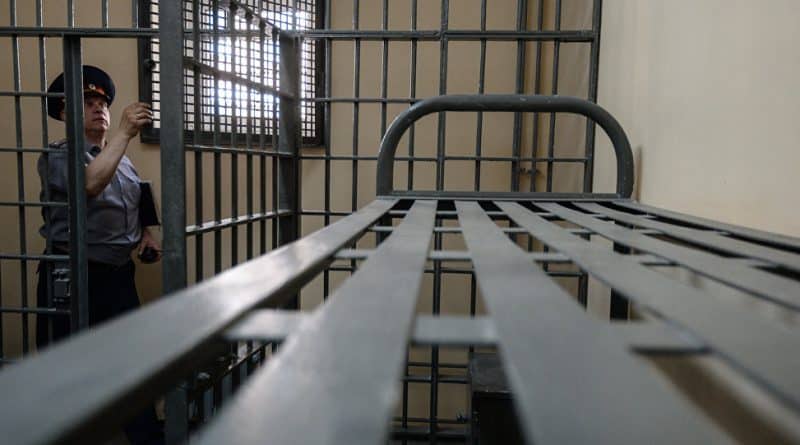In Kyrgyzstan, human rights defenders were denied passes for checks in Bishkek’s places of detention
Bishkek’s commandant’s office refused to issue passes to the National Center for the Prevention of Torture to conduct checks in prisons. This was reported to ACCA by Acting Director of the National Center for the Prevention of Torture, Dinara Sayakova.
According to her, today the prisoners are the most vulnerable, as nobody is allowed to visit them. This is justified by the severe epidemiological situation.
“No one can come and check how they are there. They don’t have phones, and they can’t complain to us. Previously, they applied to the Center through lawyers and relatives. Any visits are prohibited now. Lawyers are not allowed. The bar wrote about this, drawing attention to the fact that this is a violation of the right to defense. It turns out that they are completely cut off, that means they are at risk. I’m not saying that they beat everyone without exception. But the risk is huge,” Dinara Sayakova said.
The human rights activist emphasizes that the center’s employees are fully prepared for visiting places of detention. They have special suits, respirators, goggles and personal care products.
“I am comfortable sitting at home and not endanger myself, but I need also thinking about how many people are there. They need help. Let me remind you that the right to protection from torture is absolute. The UN Committee for the Prevention of Torture, on the basis of an optional protocol, sent us recommendations. They clearly state that governments should not prohibit the operation of national preventive mechanisms. On the contrary, it should facilitate the fulfillment of their mandates during the period of the coronavirus pandemic,” the Acting Director of the National Center added.
The document spells out how to act for human rights organizations in times of danger of the spread of a new coronavirus infection, what to look for and what preventive measures to apply when visiting prisoners.
“Now we don’t know what is happening there. We draw information from the media. Recently they wrote that the employees of the State Penitentiary Service disinfect the premises and are provided with personal hygiene products. But is it really so, I can’t say. This is our work to visit places, to check whether everything is complied with and to inform the public about it,” Sayakova notes.
The human rights activist emphasizes that she regards the fact that the Ministry of Internal Affairs and Bishkek’s commandant’s office denied passes to the National Center staff as an obstruction to the Center’s activities.
“Perhaps this was done intentionally to hide the facts. I don’t assert it, but it can be. Otherwise, how I can explain that two commandant’s offices gave passes to my employees in Osh and Jalal-Abad regions, where the epidemiological situation is worse,” she said.
According to Dinara Sayakova, today all the hope is for the media. Press reports will be able to influence the situation. After all, she has not been able to achieve at least some kind of response from the official bodies for almost two weeks.
“The commandant ignores my official calls and messages in messengers and social networks. There is no answer from the Minister of Internal Affairs too. I sent him a letter ten days ago. On April 6, I turned to our coordinating council. It is the supreme body of the National Center. I asked them to appeal to the Parliament. They sent an appeal to the Committee on the rule of law, the fight against crime and the fight against corruption. They are still considering the appeal. So, we are waiting,” the human rights activist concluded.
The situation for the ACCA was commented on in the Coalition against Torture in Kyrgyzstan.
“We proceed from the Decree of the President and the Law “On emergency”. Article 17 of the law says that the creation of a commandant’s office of a locality, in which a state of emergency is imposed, does not suspend the activities of state bodies and local self-government bodies operating in that territory, unless otherwise provided by a Presidential decree or Parliament’s decree on a state of emergency,” said the Coalition’s Executive Director, Indira Sautova.
According to her, the NCPT is a state body and its activities should not be suspended in the city of Bishkek.
“The national preventive mechanism should not suspend work due to the introduction of emergency situation. On the contrary, a crowd of people in a temporary detention center, when the penitentiary service refuses to accept state human rights defenders, entails massive violations of rights and creates risks of infection for both, staff and detainees. Meetings with relatives and lawyers are also prohibited. The investigation is ongoing. And then, who will take preventive measures in closed institutions? People, who are in prisons, are forbidden to receive food. Lawyers don’t visit them. We don’t know, what is happening in closed institutions. Therefore, the state body, whose mandate is directly aimed at preventing these measures, must be provided with access to places of detention,” she emphasized.




